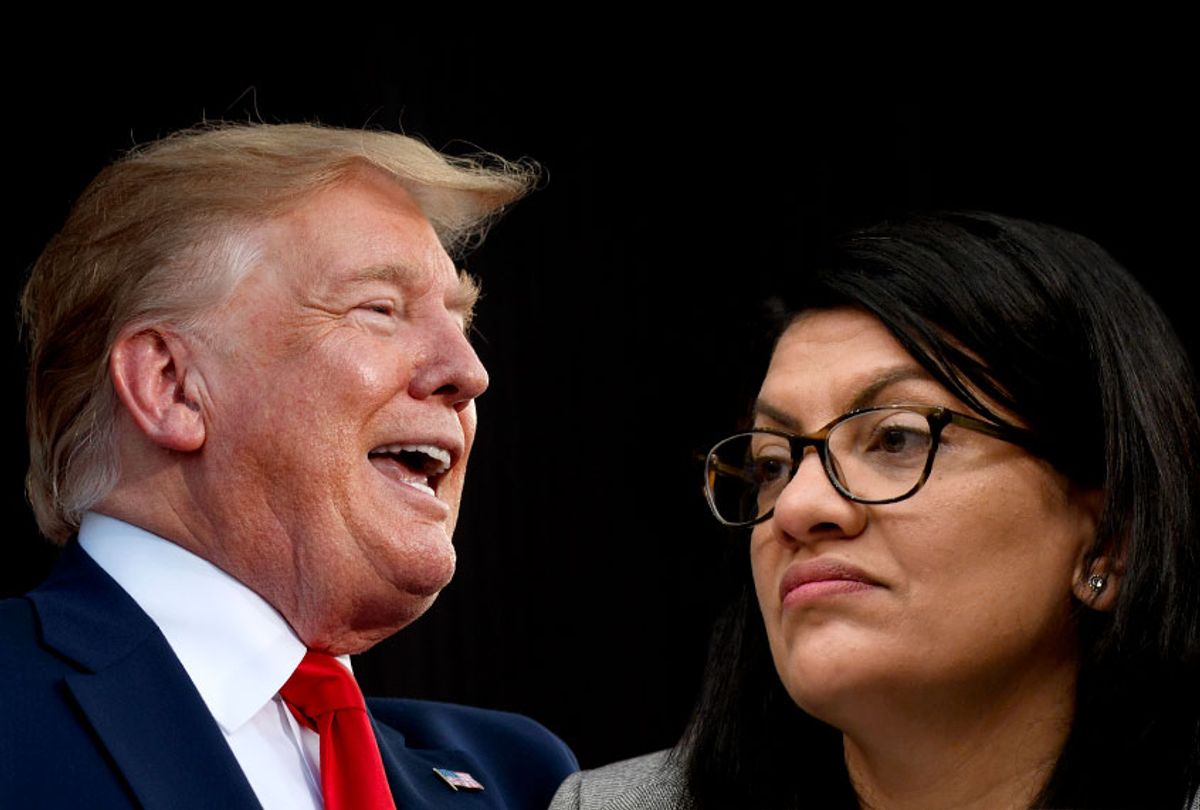President Donald Trump on Monday accused Rep. Rashida Tlaib, D-Mich., of fostering "tremendous hatred of Israel and the Jewish people" in the wake of comments she made about the Holocaust, which have drawn fierce criticism from top House Republicans and right-wing websites.
In response to a question about her support for a one-state solution to the Israeli-Palestinian conflict, Tlaib said in an interview released Friday that she has a "calming feeling" when she thinks about the Holocaust, because her Palestinian ancestors "lost their land" and "lost their lives" in an effort "to create a safe haven for Jews" in the Middle East after the Holocaust.
"I love the fact that it was my ancestors that provided that right, in many ways, but they did it in a way that took their human dignity away, right, and it was forced on them," Tlaib added. "And so when I think about a one-state, I think about the fact that: Why couldn't we do it in a better way?"
Trump on Monday seized on the controversy and criticized Tlaib, the nation's first Palestinian-American woman to serve in Congress, for her remarks.
"Democrat Rep. Tlaib is being slammed for her horrible and highly insensitive statement on the Holocaust," Trump tweeted. "She obviously has tremendous hatred of Israel and the Jewish people. Can you imagine what would happen if I ever said what she said, and says?"
In the wake of the backlash, Tlaib has accused her critics of "trying to silence" her and advance a "racist and hateful agenda."
"Policing my words, twisting & turning them to ignite vile attacks on me will not work. All of you who are trying to silence me will fail miserably," the freshman lawmaker tweeted Sunday. "I will never allow you to take my words out of context and push your racist and hateful agenda. The truth will always win."
Tlaib's office also later put out a statement clarifying her earlier remarks to Yahoo News.
"The congresswoman did not in any way praise the Holocaust, nor did she say the Holocaust itself brought a calming feeling to her," spokesman Denzel McCampbell said. "In fact, she repeatedly called the Holocaust a tragedy and a horrific persecution of Jewish people."
Nevertheless, Tlaib's comments quickly came under mounting scrutiny from top Republicans and right-wing websites, including Breitbart and the Daily Caller. Trump, for his part, used the remarks as an opportunity to highlight his pro-Israel agenda. In an apparent effort to increase his popularity among Jewish American voters, Trump has repeatedly asserted the false claim that Democrats are "anti-Israel" and "anti-Jewish" throughout his White House tenure.
The president made clear his support of Israel by reversing longstanding U.S. policy and announcing earlier this year his administration's support for Israel's claim to sovereignty over the Golan Heights, which is the contested territory Israel seized from Syria during the Six-Day War in 1967 and formally annexed in 1981.
Israel's annexation of the Golan Heights has not been recognized by the larger international community, which considers the occupied territory and Israeli settlements there to be illegal under international law. The U.S. previously refused to recognize Israeli sovereignty over the area, in accordance with U.N. Security Council resolution 242, which states that the "inadmissibility of the acquisition of territory by war and the need to work for a just and lasting peace in which every state in the area can live in security."
Trump has sought to spotlight divisions among Democrats in the House of Representatives over Israel and anti-Semitism, while many Democrats running to challenge him in 2020 have distanced themselves from the issue and allying with the American Israel Public Affairs Committee (AIPAC), a political group strongly supportive of Israeli Prime Minister Benjamin Netanyahu, who has aligned himself with Trump.
The Trump administration has delayed the release of its long-awaited Middle East peace plan. The White House has vowed since its early days to broker a groundbreaking peace agreement between Israel and Palestine, but officials have offered few details about a plan or when it might be made public.
David Friedman, the U.S. ambassador to Israel, said in January that the proposal would be presented "within several months." National security adviser John Bolton said last month that the administration would roll out its plan "in the very near future."
Secretary of State Mike Pompeo told CNN last month that the peace initiative the White House is expected to release would "represent a significant change from the model that's been used."
While Trump and his staffers have praised Netanyahu's involvement in the proposal, the administration has had few discussions with Palestinian officials, who cut off all official contact with the administration in December 2017 when Trump followed through on a campaign promise to recognize Jerusalem as Israel's capital.
Palestinian Authority Prime Minister Mohammad Shtayyeh, who was sworn in last month, further cast doubt on the chances of striking a forthcoming deal with the Trump administration, telling the Associated Press that any peace initiative would be "born dead."
"There are no partners in Palestine for Trump," Shtayyeh said. "There are no Arab partners for Trump, and there are no European partners for Trump."

Shares